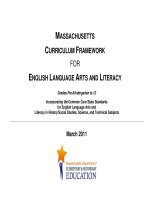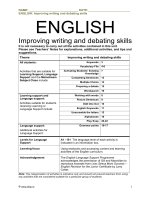ENGLISH - Improving writing and debating skills potx
Bạn đang xem bản rút gọn của tài liệu. Xem và tải ngay bản đầy đủ của tài liệu tại đây (1.13 MB, 25 trang )
NAME: _____________________________ DATE:_________________________
ENGLISH: Improving writing and debating skills
© www.elsp.ie
1
ENGLISH
Improving writing and debating skills
It is not necessary to carry out all the activities contained in this unit.
Please see Teachers’ Notes for explanations, additional activities, and tips and
suggestions.
Theme
Improving writing and debating skills
Keywords
3
Vocabulary File
4-6
Activating Students’ Existing
Knowledge
7
Completing Sentences
13
Multiple Choice
14
Preparing a debate
15
All students:
Activities that are suitable for
Learning Support, Language
Support and the Mainstream
Subject Class include:
Wordsearch
19
Working with words
8
Picture Sentences
9
Odd One Out
10
English Keywords
11
Unscramble the letters
12
Alphaboxes
18
Learning support and
Language support:
Activities suitable for students
receiving Learning or
Language Support include:
Play Snap
20-22
Language support:
Additional activities for
Language Support:
Grammar points
16-17
Levels for Language
Support
A1 – B1 The language level of each activity is
indicated in an information box.
Learning focus
Using textbooks and accessing content and learning
activities of the English curriculum.
Acknowledgement
The English Language Support Programme
acknowledges the permission of Gill and Macmillan to
reproduce excerpts from Less Stress More Success –
English Revision for the Junior Certificate by Larry
Cotter.
Note: The categorisation of activities is indicative only and should not prevent teachers from using
any activities that are considered suitable for a particular group of students.
NAME: _____________________________ DATE:_________________________
ENGLISH: Improving writing and debating skills
© www.elsp.ie
2
Making the best use of these units
Learning Record
A copy of the Learning Record should be distributed to each learning support and language
support student.
Students should:
1. Write the subject and topic on the record.
2. Tick off/date the different statements as they complete activities.
3. Keep the record in their files along with the work produced for this unit.
4. Use this material to support mainstream subject learning.
Introduction of a topic or activity should ensure that students understand what they are
doing and why. Many students will have some difficulty in understanding both the language
in the activity and the instructions/purpose for carrying out the activity.
You can create your personal teaching resource by printing these units in full and filing
them by subject in a large ring binder.
Encourage students to:
o Bring the relevant subject textbooks to learning/language support class. It
does not matter if they have different textbooks as the activities in these units
refer to vocabulary and other items that will be found in all subject textbooks.
These units are based on curriculum materials.
o Take some responsibility for their own learning programmes by:
Developing a personal dictionary for different subjects, topics, and
other categories of language, on an on-going basis. This prompt is a
reminder.
Recording what they have learnt on the Learning Record,
which should be distributed at the start of each unit.
Keeping their own files with good examples of the work
produced for different subjects and topics. This file will be an
invaluable learning resource in supporting mainstream
learning.
Indicates that answers may be found at the end of the unit.
Don’t forget that many of the activities in these units are also suitable as homework tasks or
for self-study.
NAME: _____________________________ DATE:_________________________
ENGLISH: Improving writing and debating skills
© www.elsp.ie
3
Keywords
The list of keywords for this unit is as follows.
Nouns
adjective/adjectives
adverbs
apostrophe
argument
audience
chairperson
comma
composition
concept
conjunctions
construction
content
debate
essay
friend/friends
gaps
grammar
group
idea
letters
motion
noun/nouns
organisation
page
paragraph
parts
prepositions
pronouns
punctuation
purpose
reader
sense
sentences
speaker/speakers
speech
spelling
style
theme
verb
vocabulary
words
Verbs
to begin
to develop
to explore
to have an idea
to help
to improve
to insert
to link
to rewrite
must
will
Adjectives
bold
casual
common
essential
formal
functional
informal
logical
personal
plural
proper
singular
NAME:_____________________________DATE:_____________________
ENGLISH: Improving writing and debating skills
© www.elsp.ie
4
Vocabulary file 1
Word Meaning Note or example*
apostrophe
argument
chairperson
construction
debate
gap
idea
* You may wish to write a sentence or phrase, make a note of the page in your
textbook where this word appears or, if English is not your first language,
provide a translation into your language.
Get your teacher to check this, then file it in your folder so you can use it in the future.
NAME:_____________________________DATE:_____________________
ENGLISH: Improving writing and debating skills
© www.elsp.ie
5
Vocabulary file 2
Word Meaning Note or example
motion
paragraph
purpose
speaker
speech
spelling
style
Get your teacher to check this, then file it in your folder so you can use it in the future.
NAME:_____________________________DATE:_____________________
ENGLISH: Improving writing and debating skills
© www.elsp.ie
6
Vocabulary file 3
Word Meaning Note or example
vocabulary
to improve
to link
I must
you will
formal
informal
Get your teacher to check this, then file it in your folder so you can use it in the future.
NAME:_____________________________DATE:_____________________
ENGLISH: Improving writing and debating skills
© www.elsp.ie
7
Activating students’ existing knowledge
Use a spidergram to activate students’ ideas and knowledge on the key
points in this chapter. See Teachers’ Notes for suggestions.
Possible key terms for the spidergram:
Learning a language
A debate
Invite newcomer students to provide key words in their own
languages.
Encourage dictionary use.
Encourage all students to organise their vocabulary into relevant
categories (e.g. meaning, nouns, keywords, verbs etc.).
All students should record vocabulary and terms
from the spidergram in their personal dictionaries.
Language Level
: All
Type of activity: Whole class
Suggested time: 10 minutes
NAME:_____________________________DATE:_____________________
ENGLISH: Improving writing and debating skills
© www.elsp.ie
8
Working with words - Tick the correct answer
1)
a) a phrase
b) dancing
c) writing
d) thinking
2)
a) grammar
b) a debate
c) an apostrophe
d) a country
Finish these sentences using the words in the box:
What do you like watching? ________________________________
What do you like playing? _________________________________
Language Level
: A1
Type of activity: Pairs or individual
Suggested time: 30 minutes
They are ________________________ a film.
He is _____________________to an audience.
They are ______________________music.
talking
playing
watching
NAME:_____________________________DATE:_____________________
ENGLISH: Improving writing and debating skills
© www.elsp.ie
9
Picture Sentences - Tick the correct answer
1.
a) This is an audience.
b) This is a novel.
c) This is a newspaper.
2. a) This is a train.
b) This is a debate.
c) This is a computer.
3. a) This is a chairperson.
b) This is an essay.
c) This is a page.
Language Level
: A1
Type of activity: Pairs or individual
Suggested time: 30 minutes
Finish these sentences using words from the box. Use
each word once:
This is ___ __________________ .
This _____ _____ _____________________.
These are ________________________.
These _______ __________________________.
__________ is ______ ____________________.
_______________ are _____________________.
a is
this
ideas
are audience
an these
speakers
debate
readers a
chairperson
NAME:_____________________________DATE:_____________________
ENGLISH: Improving writing and debating skills
© www.elsp.ie
10
Odd One Out
Circle the word which does not fit with the other words in each
line.
Example: apple orange banana taxi
1. letters song personal formal
2. speakers motion debate game
3. grammar dog parts of speech verb
4. nouns singular cat plural
Working with a partner, put a circle around the words that refer to
people speaking or debating in public.
Use your dictionary or textbook if you are not sure.
Language
Level
: A1 / A2
Type of activity: Pairs or individual
Suggested time: 20 minutes
debate sunshine
motion
cars speakers
speech window dinner
chairperson rules audience
NAME:_____________________________DATE:_____________________
ENGLISH: Improving writing and debating skills
© www.elsp.ie
11
English keywords
Fill in the missing letters of the keywords listed below.
On the line beside each word, write whether the word is a noun, an
adjective or a verb.
1. pun_ _uat_ _n _________________
2. adj_ _ti_e _________________
3. voca_ _la_y _________________
4. com_o _i _ion _________________
Write one paragraph supporting the argument that ‘young people should
attend school’. Use as many nouns
, verbs and adjectives as you can.
_____________________________________________________________________
_____________________________________________________________________
_____________________________________________________________________
_____________________________________________________________________
_____________________________________________________________________
_____________________________________________________________________
_____________________________________________________________________
_____________________________________________________________________
_____________________________________________________________________
_____________________________________________________________________
_____________________________________________________________________
Check that all the vocabulary you used is in your personal dictionary.
Language
Level
: A2 / B1
Type of activity: Individual
Suggested time: 40 minutes
NAME:_____________________________DATE:_____________________
ENGLISH: Improving writing and debating skills
© www.elsp.ie
12
Unscramble the letters
1. This is someone is charge of a debate SHIPEACRONR
Answer __________________
2. These are all the words you know and use CALVOARYBU
Answer __________________
3. These are words that describe nouns EDESTAJCIV
Answer __________________
4. This is the way that letters join together to make words
SLEINPGL
Answer __________________
Solve the secret code
Example: (code) YBGX = GAME (English)
YQBGGBQ FR XRRXSOFBC =
English=
A
E
G
I
L
M
N
R
S
T
Code= B
X
Y
F
C
G
S
Q
R
O
Language
Level
: A1 / A2
Type of activity: Pairs or individual
Suggested time: 20 minutes
Look at each
word as you
write the
answer.
Is your
spelling
correct?
Can you
pronounce
the word?
Do you know
what the
word means
?
Have you got
this word in
your personal
dictionary?
NAME:_____________________________DATE:_____________________
ENGLISH: Improving writing and debating skills
© www.elsp.ie
13
Completing text
Fill in the blanks in these sentences. Use words from the Word Box
below.
A paragraph is a group of _______________ with a united purpose. All the
sentences in a paragraph are _____________ by a common idea, theme or
concept. When you have explored or developed one _________ and are ready to
move on to the next, you must begin with a new _______________. This is
essential to give your reader a sense of the logical organisation of the essay.
Good paragraphing helps the reader to have a clear idea of the shape and
_____________ of your composition.
Word Box
purpose sentences linked
paragraph idea
What are these words connected to?
argument
speaker ______________________________________
chairperson
What do these words mean?
formally ________________________________________
informally ______________________________________
Use your dictionary if necessary!
Language
Level
: A2 / B1
Type of activity: Pairs or individual
Suggested time: 30 minutes
NAME:_____________________________DATE:_____________________
ENGLISH: Improving writing and debating skills
© www.elsp.ie
14
Multiple choice
(Read the text below and choose the best answers)
WRITING LETTERS
Personal letters, to close family members, lovers and friends will always be written in a
casual and intimate style. The language should be informal. The content will reflect the close
nature of the relationship. Your address should appear in the top right-hand corner of the
page followed by the date. The greeting should be appropriately casual or friendly and is
followed by a comma.
Begin the body of the letter on the next line directly beneath this comma. Each new idea or
subject means a new paragraph. Your closing salutation will be affectionate and casual.
A formal letter is less intimate than a personal letter. The purpose may be to make a formal
request, to complain about a faulty product or service, to apply for a job or position, or to
respond to an important event. Your audience is a person or group with whom you have a
formal relationship.
Your address and the date appear in the top right-hand corner. The name and address of
the person you are writing to should start on the following line aligned with the left-hand
margin.
If you use the person's name in the greeting then the closing salutation should be 'Yours
sincerely,’ followed by your signature. When you do not use the person's name the letter
concludes 'Yours faithfully,’ followed by your signature.
1. Where does your address go when you are writing a letter?
a). top right-hand corner b). middle of the page
c). top left-hand corner d). bottom right-hand corner
2. What kind of greeting opens an informal letter?
a). cold and formal b). scary
c). casual and friendly d). none
3. How do you close a formal letter to a person whose name you use?
a). with dirty hands b). with a joke
c). with ‘Yours sincerely’ d). with ‘Yours faithfully’
4. Should you be less intimate in a formal letter than in an informal letter?
a). Yes b). No
5. Should you use a formal letter to apply for a job?
a). Yes b). No
Language
Level
: A2 / B1
Type of activity: Individual
Suggested time: 30 minutes
NAME:_____________________________DATE:_____________________
ENGLISH: Improving writing and debating skills
© www.elsp.ie
15
Writing
You are going to write an argument, with your partner or group, to
support a debate on the topic “Why doing well at school is important
for children”.
You have a limited time to write your argument so you must watch the
time carefully.
1. 5 Minutes.
List some points related to your argument. For example, doing well
at school improves your chances of going to university and of
getting a good job in the future.
2. 10 Minutes
Identify as much vocabulary as possible. Use textbooks,
dictionaries, and your own language as resources for vocabulary.
3. 5 Minutes
Organize the vocabulary into the parts of the argument (e.g.
introduction/ beginning, the main part, the conclusion).
4. 20 Minutes
Write your debate.
You will be presenting your argument during the next class. So be
prepared!
Language
Level
: B1
Type of activity: Pairs / small groups
Suggested time: 40 minutes
NAME:_____________________________DATE:_____________________
ENGLISH: Improving writing and debating skills
© www.elsp.ie
16
Grammar points
In this Unit, we came across the following nouns:
• sentences
• letters
• speakers
Look up these words up in your dictionary.
Put each word into a sentence. Don’t forget your punctuation.
sentences
____________________________________________
letters
____________________________________________
speakers
____________________________________________
Noun Hunt
Circle the 10 nouns in these columns. Score 4 points for each correct
answer. Who will score the highest? Perhaps you will. Good luck!
you
debate
improve
adjective
speech
when
rewrite
vocabulary
construction
your
inserted
poor
commas
formal
singular
personal
noun
preposition
adverbs
proper
grammar
Score: ________points
Language
Level
: All
Type of activity: Individual
Suggested time: 30 minutes
NAME:_____________________________DATE:_____________________
ENGLISH: Improving writing and debating skills
© www.elsp.ie
17
Have you ticked
this activity on your
Learning Record?
Grammar points
In this unit, we came across the following prepositions.
around out in
under in between
to from
_____________________________________________________
Level A1
Use your textbook to find phrases that use these prepositions. Write out the
phrases and check that you understand them. You can add a translation into
your own language.
Level A2
Put the prepositions into sentences using vocabulary from your
Keywords
page.
If you are not sure, check your textbook.
Level B1
Write a paragraph on the topic ‘School Debates’ using the vocabulary from your
Keywords
page.
Get your teacher to check your work then file it in your folder in the
English
section.
Language
Level
: All
Type of activity: Individual
Suggested time: 30 minutes
NAME:_____________________________DATE:_____________________
ENGLISH: Improving writing and debating skills
© www.elsp.ie
18
Alphaboxes
Using your textbook, find one word beginning with each of the letters of the alphabet.
Write the word in the relevant box. You could also write the word in your own language.
a b c
d e f
g h i
j k l
m n o
p q r
s t u
V w xyz
Do you
understand
all these
words?
Get your
teacher to
check this,
then file it in
your folder
so you can
use it in the
future.
NAME:_____________________________DATE:_____________________
ENGLISH: Improving writing and debating skills
© www.elsp.ie
19
Word Search
Find the words below.
ARGUMENT
AUDIENCE
CHAIRPERSON
COMMA
COMPOSITION
CONCEPT
CONJUNCTIONS
CONSTRUCTION
CONTENT
DEBATE
ESSAY
GAPS
GRAMMAR
GROUP
IDEA
MOTION
ORGANISATION
PAGE
PARAGRAPH
PARTS
PREPOSITIONS
PRONOUNS
PUNCTUATION
PURPOSE
SENSE
NAME:_____________________________DATE:_____________________
ENGLISH: Improving writing and debating skills
© www.elsp.ie
20
Play Snap
Make Snap cards with 2 sets of the same keywords. See
Notes for teachers
for ideas about how to use the cards.
adjectives
adjectives
parts of speech
parts of speech
spelling
spelling
NAME:_____________________________DATE:_____________________
ENGLISH: Improving writing and debating skills
© www.elsp.ie
21
apostrophe
apostrophe
grammar
grammar
improve
improve
NAME:_____________________________DATE:_____________________
ENGLISH: Improving writing and debating skills
© www.elsp.ie
22
friends
friends
debate
debate
rewrite
rewrite
NAME:_____________________________DATE:_____________________
ENGLISH: Improving writing and debating skills
© www.elsp.ie
23
Answer key
Odd One Out = song, game, dog, cat
Letter Scramble = chairperson, vocabulary, adjectives, spelling
Secret Code = grammar is essential
debate
motion
speakers
speech
chairperson rules audience
NAME:_____________________________DATE:_____________________
ENGLISH: Improving writing and debating skills
© www.elsp.ie
24
Completing Text =
A paragraph is a group of sentences with a united purpose. All the sentences in a
paragraph are linked by a common idea, theme or concept. When you have explored or
developed one idea and are ready to move on to the next, you must begin with a new
paragraph. This is essential to give your reader a sense of the logical organisation of
the essay. Good paragraphing helps the reader to have a clear idea of the shape and
purpose of your composition.
(
Less Stress More Success – English Revision for the Junior Certificate
, page 18)
M
ultiple Choice =
a, c, c, a, a
Grammar Points = debate, adjective, speech, vocabulary, construction,
commas, noun, preposition, adverbs, grammar
NAME:_____________________________DATE:_____________________
ENGLISH: Improving writing and debating skills
© www.elsp.ie
25
Word Search:









